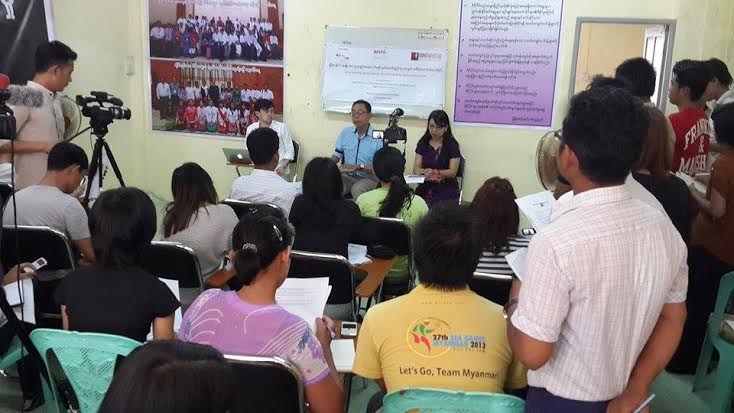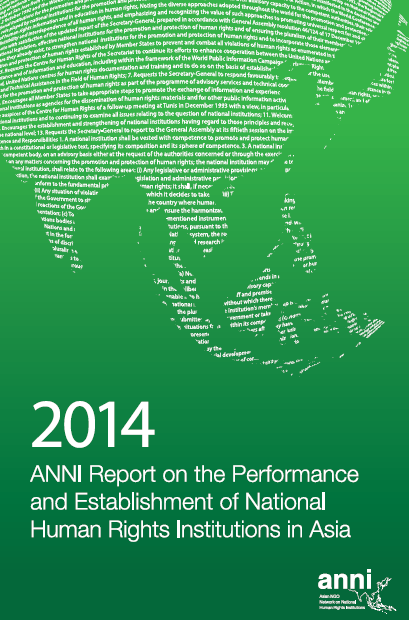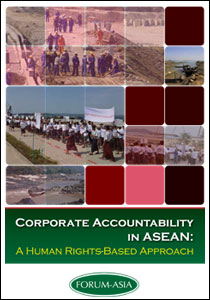Posts Tagged ‘Forum-Asia’ (43 found)
HRC28, Item 4 : Interactive Dialogue with the UN Special Rapporteur on the Situation of Human Rights in Burma/Myanmar, Ms. Yanghee Lee
8th Regular Session of the UN Human Rights Council Oral Statement Delivered by Khin Ohmar on behalf of Asian Forum for Human Rights and Development (FORUM-ASIA) […]
• • •28th Regular Session of the UN Human Rights Council: Oral Statement Delivered by Khin Ohmar on behalf of Asian Forum for Human Rights and Development (FORUM-ASIA)
Thank you, Mr. President. FORUM-ASIA, in solidarity with Equality Myanmar and Burma Partnership welcomes the Special Rapporteur’s report […]
• • •The Myanmar National Human Rights Commission Continues Failing to Deliver
 A report authored by Burma Partnership and Equality Myanmar was launched on 25 September 2014 in Rangoon revealing the continuing ineffectiveness of the Myanmar National Human Rights Commission (MNHRC) as well as the lack of independence from the government. The report was launched on the same day that a reshuffle of the members of MNHRC was announced by the government, which came as a complete surprise to civil society organizations due to the lack of consultation.
A report authored by Burma Partnership and Equality Myanmar was launched on 25 September 2014 in Rangoon revealing the continuing ineffectiveness of the Myanmar National Human Rights Commission (MNHRC) as well as the lack of independence from the government. The report was launched on the same day that a reshuffle of the members of MNHRC was announced by the government, which came as a complete surprise to civil society organizations due to the lack of consultation.
Released at the Myanmar Journalists Network in Rangoon, Burma: All the President’s Men, contributed to the annual Asian NGO Network on National Human Rights Institutions (ANNI) Report on the Performance and Establishment of National Human Rights Institutions in Asia (2014). The report analyzes the Myanmar National Human Rights Commission Law 2014 enacted in March this year (enabling law) that institutionalizes the mandate of the MNHRC. The report finds that the law does not guarantee independence from the government and in particular, the president’s office. In contravention of international standards on national human rights institutions, namely the Paris Principles, the selection process does not adequately consult with civil society. As the report points out, “It is up to the selection board to come up with procedures for short-listing candidates, yet the enabling law itself should set out the process/procedure for selection, with consultations with civil society.” The members of the MNHRC are actually chosen by a selection board of ten, five of which are from the government or are government-affiliated. The enabling law states that two members of this board are to come from civil society organizations and a further two are to be MP, yet there is no transparency regarding the procedures under which the two MPs are chosen. Additionally, the chosen civil society members to the selection board are restricted to registered civil society only, thus excluding many outspoken and critical political and human rights groups who feel they cannot register under the current climate […]
• • •New Report Exposes the Continued Ineffectiveness of the Myanmar National Human Rights Commission
Today, the 2014 report on the performance of the Myanmar National Human Rights Commission (MNHRC), All the President’s Men, was released at the Myanmar Journalists Network in Rangoon. Co-authored by Burma Partnership and Equality Myanmar, the report, which contributed to the annual report […]
• • •Invitation: Briefing for the Launch of 2014 Report on the Performance of Myanmar National Human Rights Commission
Invitation: Briefing for the Launch of 2014 Report on the Performance of Myanmar National Human Rights Commission 24 September 2014 Dear Friends and Leaders, You are cordially invited to a meeting for a briefing on the performance of the Myanmar National Human Rights Commission (MNHRC) 2014 report, co-authored by Burma Partnership and Equality Myanmar. The […]
• • •2014 ANNI Report on the Performance and Establishment of National Human Rights Institutions in Asia
 The Asian Forum for Human Rights and Development (FORUM-ASIA), as the Secretariat of the Asian NGO Network on National Human Rights Institutions (ANNI), humbly presents the publication of the 2014 ANNI Report on the Performance and Establishment of National Human Rights Institutions in Asia. Our sincere appreciation goes to all 31 ANNI member organisations from across 18 countries in Asia for their participation and commitment to ANNI and continued advocacy towards the strengthening and establishment of NHRIs in Asia. Similarly, we would also like to extend our sincere thanks to the National Human Rights Institutions (NHRIs) that have contributed valuable inputs and feeback to the concerned country reports. This year, the ANNI Secretariat is heartened at the level of engagement and interaction between ANNI members and their respective NHRIs in the course of the reportwriting process.
The Asian Forum for Human Rights and Development (FORUM-ASIA), as the Secretariat of the Asian NGO Network on National Human Rights Institutions (ANNI), humbly presents the publication of the 2014 ANNI Report on the Performance and Establishment of National Human Rights Institutions in Asia. Our sincere appreciation goes to all 31 ANNI member organisations from across 18 countries in Asia for their participation and commitment to ANNI and continued advocacy towards the strengthening and establishment of NHRIs in Asia. Similarly, we would also like to extend our sincere thanks to the National Human Rights Institutions (NHRIs) that have contributed valuable inputs and feeback to the concerned country reports. This year, the ANNI Secretariat is heartened at the level of engagement and interaction between ANNI members and their respective NHRIs in the course of the reportwriting process.
ANNI also expresses its thanks and appreciation to the Asia-Pacific Forum (APF) for its continued engagement with ANNI at various levels- most recently at the 7th ANNI Regional Consultation in Taiwan where joint advocacy action with national groups towards the establishment of an independent NHRI took place. At the same time, ANNI welcomes the engagement, for the first time, with the Civil Society and Human Rights Network (Afghanistan) […]
• • •Briefing Paper on the Situation of Human Rights in Burma/Myanmar 25th Regular Session of the UN Human Rights Council
1.0 Introduction While acknowledging the positive developments that have occurred in some areas relating to human rights in Burma/Myanmar, in other areas, progress has been lacking, while in some others still, significant backsliding has taken place. The areas that have witnessed significant backsliding or lack of progress include: the continued criminalisation and harassment of political […]
• • •Corporate Human Rights Abuses in ASEAN: Civil Society Calls for Corporate Accountability and Compliance with International Human Rights Law
Civil society groups called for greater corporate accountability in the region, which requires a regulatory framework based on international human rights norms and standards, to address the escalation of corporate human rights abuses in ASEAN, during the launch of a report, titled “Corporate Accountability in ASEAN: A Human Rights-Based Approach”, in Jakarta yesterday […]
• • •Corporate Accountability in ASEAN : A Human Rights-Based Approach
 Corporate Accountability in ASEAN: A Human Rights-Based Approach assesses the impacts of business on human rights in the ASEAN sub-region. Originating from cases presented at two public hearings organised by civil society groups in 2011 in response to the ASEAN Intergovernmental Commission on Human Rights (AICHR)’s undertaking of a thematic study on the topic of “corporate social responsibility” (CSR) in ASEAN, this report documents cases of human rights violations in relation to business activities in the sub-region, and demonstrates that voluntary CSR initiatives promoted by businesses – and by ASEAN institutions – are insufficient […]
Corporate Accountability in ASEAN: A Human Rights-Based Approach assesses the impacts of business on human rights in the ASEAN sub-region. Originating from cases presented at two public hearings organised by civil society groups in 2011 in response to the ASEAN Intergovernmental Commission on Human Rights (AICHR)’s undertaking of a thematic study on the topic of “corporate social responsibility” (CSR) in ASEAN, this report documents cases of human rights violations in relation to business activities in the sub-region, and demonstrates that voluntary CSR initiatives promoted by businesses – and by ASEAN institutions – are insufficient […]
Civil Society Organisations Demand Meaningful Engagement with ASEAN Human Rights Bodies
Civil Society from a number of ASEAN countries have just convened at the 6th Regional Consultation on ASEAN and Human Rights in Jakarta from 1-2 October 2013. Over 80 participants from more than 59 organizations, both within and outside the ASEAN region gathered to discuss a range of issues, including strategies for bringing about meaningful engagement with ASEAN human rights mechanisms […]
• • •








 All posts
All posts